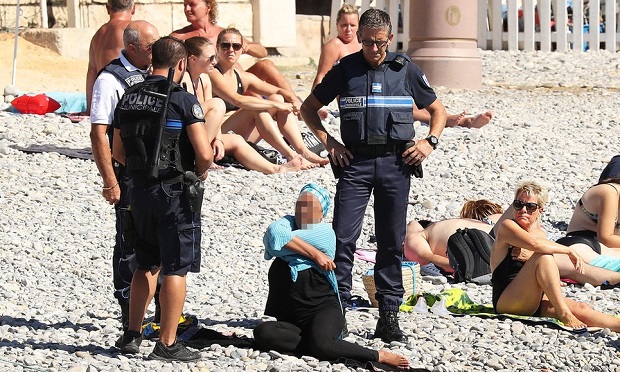
Source: Vantagenews.com
This week, photos emerged of French police citing a woman on the beach and requesting her to remove her burkini. The citation noted that the women was not “wearing an outfit respecting good morals and secularism.” The burkini was created by Australian Aheda Zanetti, and according to Zanetti, is a swim garment for a modest person, a new mother who doesn’t want to wear a bikini, or someone who has skin cancer. Though a Muslim herself, Zanetti asserts that the burkini is not symbolic of Islam, and instead, was created as a means to foster integration, acceptance, and non-judgement.
Nonetheless, the burkini and the Muslim women who wear them have been the target of legislation that suggests the attire is a threat to social relations and public safety. Most of this discourse and policy followed the Bastille Day attacks that happened in July. Since then, several French towns, including Nice, have banned burkinis. In a letter to Prime Minister Manuel Valls, Nice’s deputy mayor said that “hiding the face or wearing a full-body costume to go to the beach is not in keeping with our ideal of social relations.” The Prime Minister, himself, previously came under scrutiny after showing support for the bans and stating that wearing a burkini was “not compatible with the values of the French Republic.”
This is sad.
While we can be empathetic to the deaths and fear caused by recent attacks, the recent measures taken, specifically the burkini ban, seem to cause more harm than good. How exactly does banning women from wearing their preferred swim garment protect people from or avoid terrorist attacks?
The decision making of the French legislators who initiated these bans suggest a polarizing mindset. A mindset where one views its own culture as good and others as bad due to the inability to understand and see the value in differences. Legislation like this ban are manifestations of such worldviews.
The bans are not only humiliating for Muslim women, but they also perpetuate a climate of polarization and conflict. It further creates an “us vs. them” dynamic. One bystander who witnessed a women being cited said, “The saddest thing was that people were shouting ‘go home’, some were applauding the police…Her daughter was crying.”
This is why cultural competence is so critical, particularly during times of conflict and strategy. One must have the capacity to, not just recognize differences, but also identify mutually adaptive strategies that are considerate of those differences. If not, we’ll continue to hear more about such bans, building walls, “Brexits,” and implementing immigration “tests.”


















